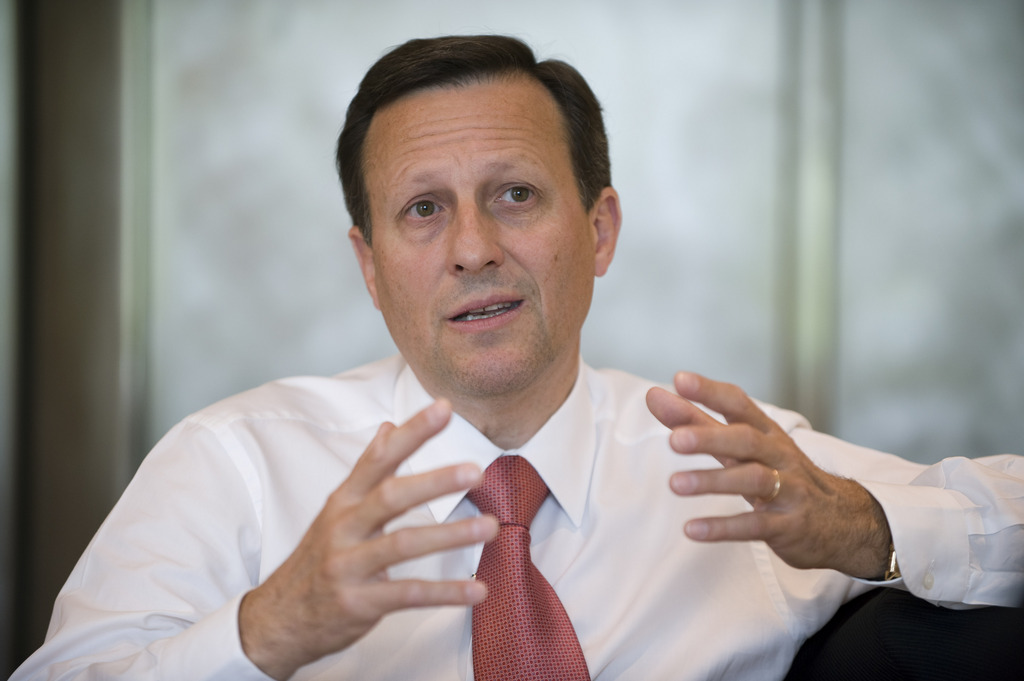Minder vote sends clear signal to executives

The Swiss press agrees that the 68 per cent approval of the fat cat initiative on Sunday’s nationwide ballot is a clear signal that there should be more transparency over top managers’ salaries and that excesses should be sanctioned.
For the Neue Zürcher Zeitung (NZZ) the result is a “blatantly obvious signal” by the people who “vented their displeasure about the salary excesses over the past years”.
The newspaper warns, however, that the “record-high acceptance of the fat-cat initiative plays into the hands of the left”, which may see the approval as an initial spark for other policies to curb salaries.
The French-language daily Le Temps called the overwhelming yes vote the “triumph of an outraged man” for which parliament holds “significant responsibility, because it hesitated to act on the issue for several years and failed to issue a proper counter-proposal”. The defeat of business interests demonstrate that these “are losing direct influence”.
And, the Quotidien Jurassien newspaper from the Jura region cited the support for the initiative as “a democratic response to the ignorance of some top managers and their despicable conduct, which left the entire country in disgust”.
Epic fight
The NZZ further pointed out that Minder achieved a very rare feat – with his proposal, he achieved the third-best result of any initiative in Switzerland, which not only won approval in urban and rural areas but also in all the cantons.
For Zurich’s Tages-Anzeiger newspaper, the decision was “a vote in favour of decency and fair salaries”. The result “does not above all express envy, but a feeling that company managers have been ransacking the coffers at the expenses of society”.
The Swiss people rewarded Minder’s “epic fight against the political establishment” and his tenacity with a 68 approval rate for the initiative, according to the Tages-Anzeiger. The Swiss Business Federation was the main opponent – and the main loser.
In a cartoon on the Tages-Anzeiger’s front page, Minder, who is from canton Schaffhausen, stands on a rock waving good-bye to a group of businessmen standing on a boat with the Swiss Business Federation’s signature, which is shooting down the Rhine Falls.
Minder’s triumph
For the German-language tabloid Blick, the vote is Minder’s triumph over the country’s most powerful lobbies, a CHF8 million ($8.5 million) campaign launched by economic federations, parliament and the government against the initiative. “A man! A victory!” reads the tabloid’s front headline.
Blick suggests that in the end it is Minder – derided by his opponents as a mouthwash salesman because he heads a dental products company – who took them to the cleaners. “Minder has the last laugh.”
Interpretation fight
There is a lot less unanimity among the Swiss press when it comes to the implementation of the initiative. Swiss newspapers say that the fight for how to interpret the results has just begun.
The NZZ commented that nobody has a monopoly on the law’s interpretation and that one cannot deduce from the result whether the electorate agrees with every one of the 24 regulations and wants them implemented word for word.
Other papers demanded the quick implementation and application of the new regulations. In future, shareholders will not only have to approve company salaries on a yearly basis, but top managers will get fined or may even have to serve prison sentences of up to three years if they break the law.
The reaction from abroad
Minder’s success also made headlines in the foreign press. The New York Times remarked that the outcome was “a triumph” for Minder, who had turned a personal fight against the management of Swissair, the flagship airline that collapsed in 2001, into a nationwide referendum against “rip-off merchants.”
The British Broadcasting Corporation (BBC) and daily newspaper The Telegraph said the anger in Switzerland was caused by the fact that salaries and bonuses for managers continued to rise despite public discontent. The BBC, The Telegraph and the Wall Street Journal stressed that the measures will give Switzerland some of the world’s strictest corporate rules.
The Financial Times (FT) also points out that Switzerland will now have even broader executive pay curbs than the European Union proposal to cap bankers’ bonuses. In its Lex column, the business paper criticises that most debates about the Swiss vote had descended into emotional mud fights.
The Financial Times also notes that executives have a price but points out that their remuneration is not set by the interplay of supply and demand because companies do not properly know executives’ productivity. For the FT, people are paid so much because power plays a big role.
“If governments or shareholders want to lower pay, they have to play the power game too,” the FT commented. “And that is exactly what happened in Europe last week and Switzerland yesterday.”
The Süddeutsche Zeitung commented in its online issue that the “enraged citizens have now also reached Switzerland”, and “they are not only allowed to protest, but may actually take decisions”. The Frankfurter Allgemeine Zeitung estimates that popular votes on excessive pay would have reached similar approval rates in other countries.
The liberal Viennese Der Standard suggests “the free economic system would benefit should the Swiss example catch on in Europe”, while the French economic newspaper Les Echos even forecast that Switzerland would “witness a revolution” and become “the world champion of shareholder democracy”.

In compliance with the JTI standards
More: SWI swissinfo.ch certified by the Journalism Trust Initiative




You can find an overview of ongoing debates with our journalists here. Please join us!
If you want to start a conversation about a topic raised in this article or want to report factual errors, email us at english@swissinfo.ch.